Understanding ExpressVPN Global Server Network – Fast, Secure & Worldwide
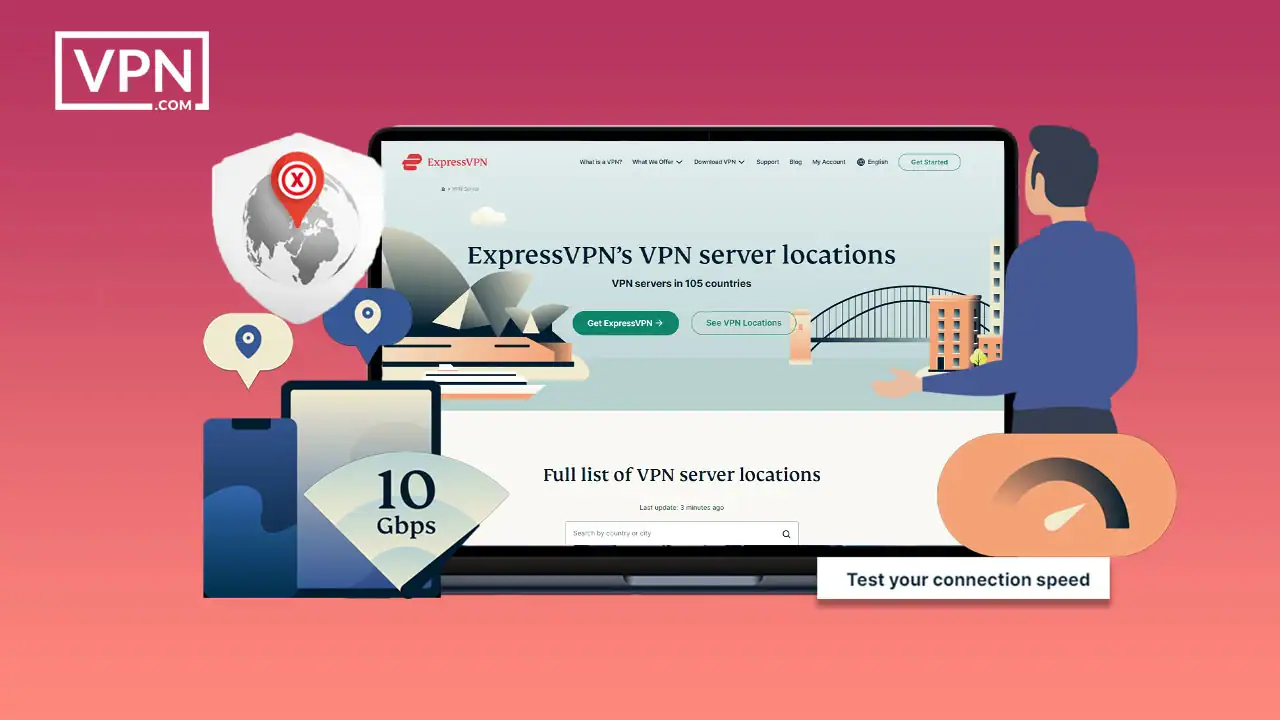
Choosing a VPN service relies largely on the network of servers offered. A good extensive network of servers would be essential to attain faster speeds, improve privacy and enable bypassing geo-restrictions from anywhere in this world.
Thus ExpressVPN shines in an excellent position worldwide with its elaborate global server network offering more than 3000 servers in 105 countries. This broad outreach provides users with opportunities to connect from almost any region, allows content access securely and ensures still greater protection of privacy.
In this article, we will take a closer look at the ExpressVPN global server network so that we can briefly describe how it works, where its servers are based and why many find it more suitable. Whether you would like fast streaming secure browsing or to keep your privacy knowing about ExpressVPN’s network of servers can guide you on whether such a VPN is appropriate for your needs.
How Many Servers Does ExpressVPN Have?
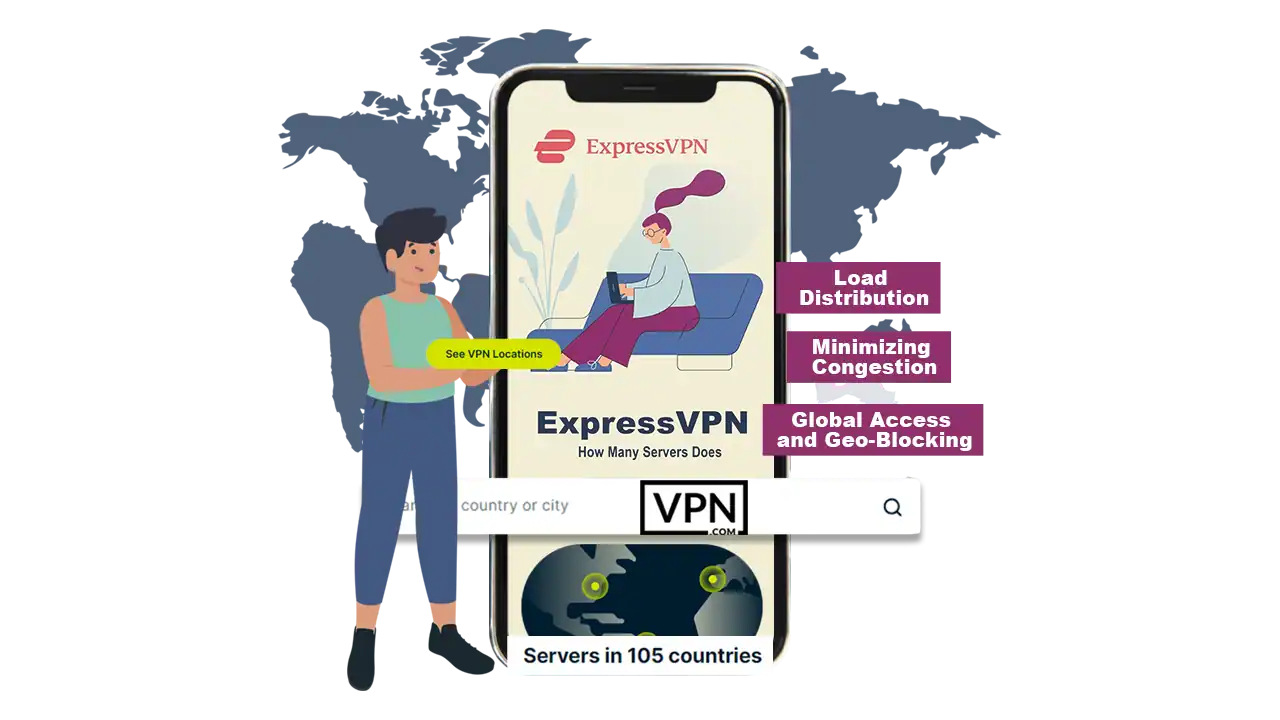
According to the recent figures published on the company’s core website, ExpressVPN global server network currently has over 3000 servers spread out in 105 countries. Such massive coverage is super scaled, which means that numerous options are available to users for getting the internet securely and privately, even from across geographical boundaries. The large number of servers gives a pretty good chance to get speedy and reliable connections anywhere in this world.
Server Distribution Across Key Regions
ExpressVPN global server network are very wisely spread across different regions so that there is robust global coverage. The following is a summary of server distribution across major regions.
- Europe: This region has wide server coverage with almost every country in Europe represented here even including servers carrying major traffic in the UK, Germany, France and the Netherlands. Europe-based servers are usually used for streaming services and access to content that is normally part of the regional domain.
- Asia Pacific: Servers are found in countries such as Japan, Singapore, Australia, and Hong Kong. ExpressVPN has considerable shows in Asia Pacific, and the main reason why users choose it is to circumvent regional censorship.
- South America: Where the server count is smaller than what is found in North America and Europe ExpressVPN delivers key locations in countries like Brazil and Argentina to access South American content.
- Africa and the Middle East: ExpressVPN also delivers servers across Africa and the Middle East where locations in South Africa Kenya and the UAE provide critical coverage in areas where internet freedom is often restricted.
This broad dispersal of servers puts ExpressVPN at an advantageous level of serving users in the most visited as well as lesser-visited regions. With such a spread you are assured that regardless of the place in the world you may find yourself in a reliable connection point will not be too far from your reach.
ExpressVPN Global Server Network Growth
ExpressVPN’s number of servers has exponentially increased over the years as service demand surges. A few years ago, ExpressVPN global server network barely accessed up to 2000 servers. It now has over 3000 servers based on continued infrastructural expansion. This has been the path through which ExpressVPN has been in a position to be able to meet the ever-increasing demands of most clients who solely depend on VPNs for security content access and privacy.
One of the primary causes for this growth is the high demand for VPNs from internet users moving about who try to hide their data from those interested in getting access to them. The more people work from out of their own homes the more they watch content abroad and the more people come to be informed about the security of the internet the more the number of ExpressVPN’s servers increases to cater to that demand.
Why a Large Number of Servers Matters?
Indeed this is one of the key reasons people end up choosing ExpressVPN over other options with large numbers of servers. So why does the size of the server network matter?
Load Distribution
With the greater number of servers, this further distributes the loads and risks that any single server might become so saturated with users that it may slow speeds and allow dropped connections to take place. An overwhelmed server may slow speeds and allow connections to be dropped. Having a high number of servers ensures ExpressVPN that the load is well-distributed, hence improving the stability and speed of connection.
Minimizing Congestion
The worst problem at peak usage times is server congestion especially when many are logged in. However, a huge portion of this problem is alleviated by the massive ExpressVPN global server network, leaving clients with a variety to pick from. If a particular server gets congested, it is a very easy transition to another that is in the same region, which is a surefire way to keep speeds and performance smooth.
Global Access and Geo-Restriction
An extensive server network is an important element of bypassing geo-restriction and censorship. Users can however connect to servers in countries with limited internet restrictions that otherwise would have inaccessible content as a result of existing and convenient roadblocks.
This is specifically true for users in the most censored regions- including China, Russia, and the Middle East. Who has limited access to internet freedom? In this regard, ExpressVPN provides customers with an easy way to bypass restrictions through offered servers in other neighbors whose internet policies are not restrictive thereby making the internet unrestricted.
It allows users worldwide to access region-specific content such as US Netflix BBC iPlayer or Amazon Prime Video by connecting to an ExpressVPN server in those regions. This flexibility makes it a great asset for any global traveler, expatriate or anyone who would want to access content across the globe.

Enjoy ExpressVPN Global Servers Network
- Wide Coverage
- Fast & Reliable
- Security & PrivacyBypass
- Global Reach
How Does ExpressVPN Global Server Network Compare To Other VPNs?

The performance and quality of a VPN can be somewhat justified by checking its server network. Now ExpressVPN is indeed one of the best in the VPN industry; however, how would its server network rank against NordVPN Surfshark or CyberGhost? Keep reading for the VPN server comparision.
Comparison of Server Count
According to the latest stats, ExpressVPN global server network is more than 3000 servers in 105 countries. At that number of servers, it is at the same level as many other first-class VPNs although some of its competitors have a few more servers on their books:
- NordVPN: NordVPN has more than 6300 servers in 111 countries, outperforming ExpressVPN in raw terms of the number of servers although it covers fewer countries. This means there may be fewer choices of location for users. Checkout our detailed NordVPN review.
- Surfshark: Surfshark has about 3200 servers in 99 countries. So Surfshark can offer wider country coverage than ExpressVPN but the overall number of servers is the same.
- CyberGhost: The server count for this group is by far the highest, reaching 11500 and it is present in 100 countries. That doesn’t necessarily always mean it’s all about better performance however because the quality of the servers does play a role as well.
By sheer count of numbers NordVPN and CyberGhost may boast longer server lists; still, ExpressVPN keeps pace with the competition by focusing more on consistency in speed and security in many of its global locations.
Global Coverage Comparison
Of course, one of its strong points is global coverage, as ExpressVPN holds servers in 105 countries across six continents. That makes it incredibly useful for users requiring access to a large number of different server locations. Compare:
- NordVPN has a presence in 111 countries and has extensive influence in both North America and Europe, yet fewer servers are present in the more remote regions of Africa and the Middle East.
- Surfshark offers a slightly broader geographical reach compared to ExpressVPN, with servers available in 99 countries.
- CyberGhost offers coverage in 100 countries not far from ExpressVPN’s presence.
ExpressVPN with the advantage of its spread of servers across regions so that both highly connected and underserved users can enjoy reliable servers. It is quite helpful to users of countries that have strict internet access because in the absence of a nearby server, it significantly boosts up the speed and reliability of the connection.
Factors That Differentiate ExpressVPN Server Network Over Other VPNs
While these might be considered for the server count and global coverage there are several specific reasons why ExpressVPN server network shines among others in different ways.
TrustedServer Technology
The most interesting feature of ExpressVPN server network seems to be its TrustedServer technology based on RAM-only servers. The very principle behind these RAM-based servers in contrast to those in the traditional storage with a hard drive is such that every time the servers are restarted they are wiped off all the data and no long-term storage is allowed of any sort of user information adding quite a strong layer of security and privacy in themselves.
On the other hand for example NordVPN and CyberGhost make use of the traditional hard-drive technology among several other VPNs. Given that they have very strong privacy policies in place the danger of data being seized and kept on the hard drives in case of a breach or government violations remains.
RAM-only servers therefore ensure that if a physical server were ever compromised no sensitive user data could be retrieved. That makes ExpressVPN an ideal choice for users that place gigantic importance on privacy and security.
Physical vs. Virtual Servers
ExpressVPN primarily uses physical servers where the servers are installed in the countries they claim to represent. This differs from most other VPN vendors such as Surfshark and CyberGhost which rely more on virtual servers.
- Virtual servers provide one country’s IP address but are hosted elsewhere. This helps access a greater number of countries but sometimes it results in slower speeds or lower security from the added redirection layers.
- ExpressVPN uses physical servers; therefore they tend to offer better reliable speeds and greater security due to the absence of a necessity for rerouting via another location.
ExpressVPN does utilize virtual servers at times like in regions where it would not be feasible to secure or maintain a physical server due to structural or security issues. However, ExpressVPN is transparent about which servers are virtual. In any case, all virtual servers run under the same TrustedServer technology thus ensuring that the privacy of users will continue to be maintained in the same manner.
Performance and Reliability Comparison
Apart from the count and features of security the performance and reliability of a VPN’s server network also lie at the heart of user experience. In how far does ExpressVPN outperform or is comparable to its peer groups in these aspects?
Real-Time Performance
ExpressVPN holds high as one of the stalwarts in terms of speed, reliability and connection stability in the VPN market. Generally, independent tests by third parties along with comparative reviews from other users confirm the fact that it is one of the fastest connections available especially in North America, Europe and Asia.
- Speed Tests: When it comes to speed tests ExpressVPN usually always dominates most regions within users’ lists mainly such as the US and UK where its optimized servers create very high-speed connections therefore according to speed tests. Whether users stream via 4K do gaming or just download large files ExpressVPN provides fast and steadfast connections.
- Competitor Comparison: NordVPN also has fantastic speed but it lags in slower connections while its overall servers are leaner around regions such as Africa and South America. Surfshark and CyberGhost can offer competitive rates with Surfshark sometimes experiencing variations during peak times.
For users seeking consistent fast speeds everywhere they go ExpressVPN is a great option for it streamlines speeds across all locations.
Server Uptime and Stability
Another strong aspect of a VPN’s server network reliability is uptime—the percentage of time at which servers are up and running without any downtime or outages. Here ExpressVPN shines at 99.9 percent uptime across its entire network meaning users can truly rely on stable connections without server availability problems.
ExpressVPN does this through constant monitoring and maintenance of the servers; if a problem occurs it is resolved within little or no time. Balancer techniques in the use of load will ensure that different servers are not overstretched hence proper work is guaranteed even during peak times.
- NordVPN and CyberGhost have high uptime although users claim sometimes servers face outages, especially in regions less equipped with infrastructure.
- Surfshark still boasts its reliable server network though some of them may load slowly during the height of usage as there are many attempting to connect at the same time.
ExpressVPN with advanced server technology monitoring in real-time and load balancing is one of the most reliable VPN services available.
What Are the Best Server Locations for ExpressVPN Users In The US?
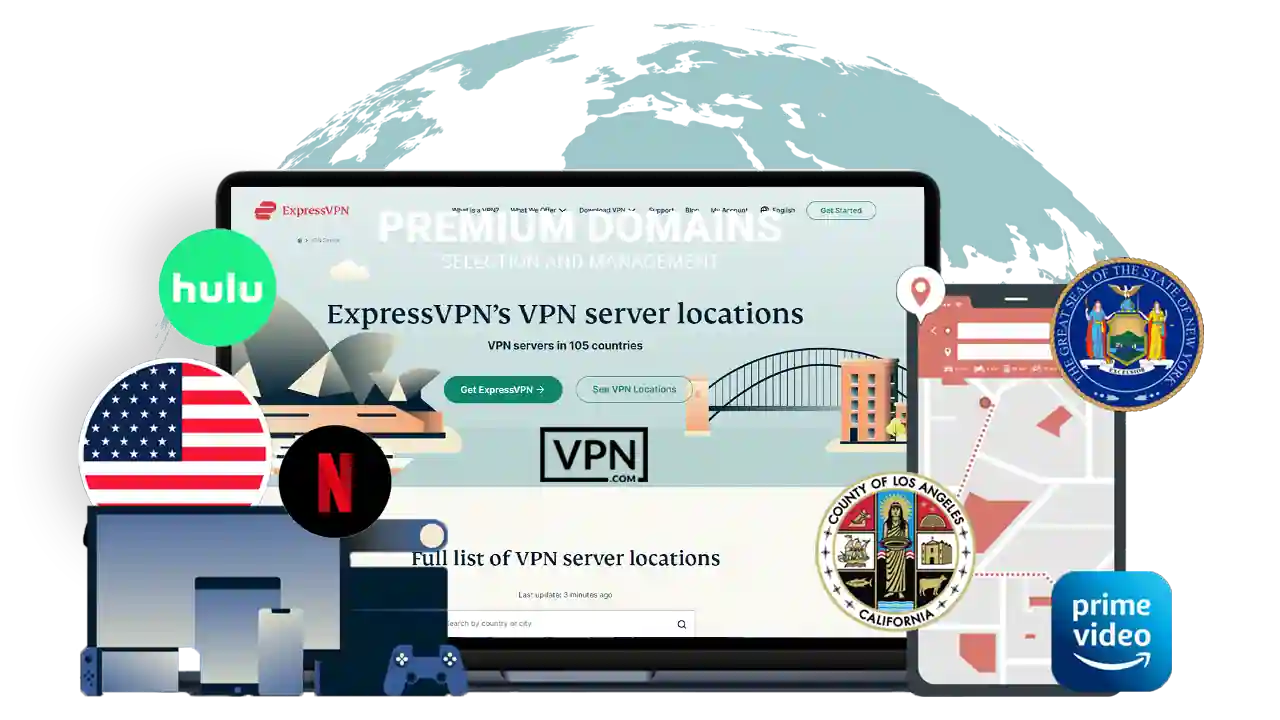
ExpressVPN server network in the United States provides users with a variety of options to suit their needs whether it is for streaming, gaming, torrenting or maintaining privacy. Based on speed tests and user feedback the following cities have some of the best performing servers:
Top Server Locations in the US
- New York: Consistently ranked as one of the best performing locations New York servers offer fast speeds and low latency for users on the East Coast. It is ideal for streaming gaming and general browsing.
- Los Angeles: Another high performance location Los Angeles servers provide fast connections for users on the West Coast and are also effective for accessing content in Asia.
- Dallas: For users in central regions Dallas servers are known for their stability and balanced performance across all types of internet activities.
These locations are optimized for speed and provide a reliable connection making them popular choices among ExpressVPN users in the US.
Optimized Server Locations for Streaming
For users looking to stream content from popular platforms such as Netflix Hulu or Amazon Prime certain US servers offer exceptional performance. The best servers for streaming are designed to bypass geo restrictions and provide high speed connections ensuring smooth buffer free streaming.
- New York: Excellent for accessing Netflix US Hulu and HBO Max. New York servers are highly reliable and can easily bypass geo blocks offering a seamless streaming experience.
- Los Angeles: Known for delivering fast streaming speeds, especially for users trying to access content from Netflix US and Disney+. It is an ideal location for West Coast users.
- Washington D.C.: Great for unblocking Amazon Prime Video and ensuring a high quality viewing experience without interruptions.
These locations are specifically optimized to handle the high bandwidth required for HD and 4K streaming making them some of the best choices for US based streamers.
Servers for Specific User Needs
1. Gaming Servers
For online gamers, latency and ping are crucial for a smooth experience. The following servers are optimized for low ping offering minimal delays for real-time gaming:
- Chicago: Offers one of the lowest pings for users in the central US making it perfect for gaming titles like Fortnite Call of Duty and Dota 2.
- Miami: Known for low latency and stable performance, especially for users on the East Coast looking for a seamless gaming experience.
2. Torrenting Servers
For users interested in P2P file sharing ExpressVPN has optimized certain servers for torrenting:
- San Francisco: One of the best locations for torrenting providing fast and secure P2P traffic without bandwidth throttling.
- Seattle: Known for its excellent download speeds and privacy protection during P2P file sharing.
3. Privacy-Oriented Servers
For users prioritizing privacy, ExpressVPN’s servers in Washington D.C. and New Jersey are ideal. These servers are optimized for high end encryption and ensure that your online activity remains anonymous while maintaining fast connection speeds.
How Does ExpressVPN Optimize Server Performance?
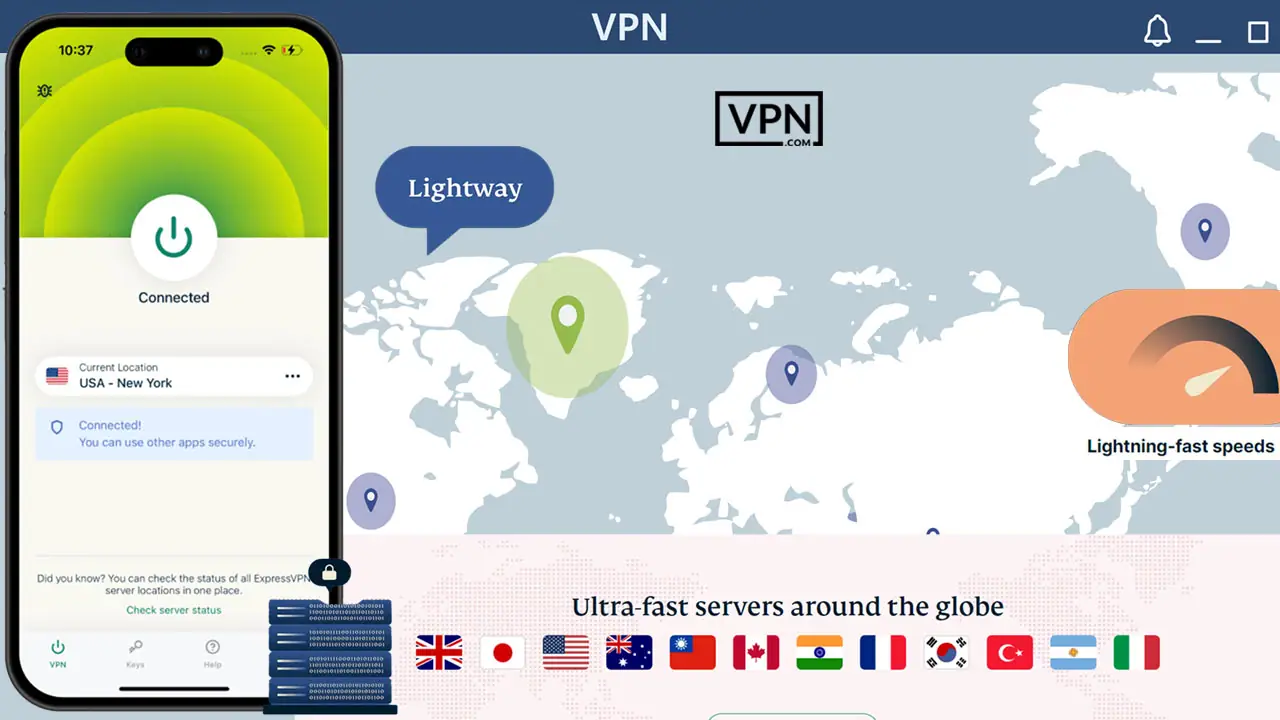
Advanced technologies from ExpressVPN ensure that their servers run smoothly and provide the user with fast, stable connections. Among them are high-bandwidth servers, proprietary Lightway protocol and load balancing. All of these technologies are necessary for superior server performance.
Load Balancing Technology
One of the big strengths of ExpressVPN in optimizing server performance is through advanced load balancing technology. The system allows the user traffic to be spread evenly across a bank of servers to make sure that no single machine becomes overwhelmed. They can therefore maintain fast and stable connections even at peak usage times by automatically diverting traffic to less congested servers.
Load-balancing ensures that the users do not have slowdowns or interruptions in their browsing, streaming, or gaming activities. Whether connecting from a high-traffic region or during busy hours, ExpressVPN’s intelligent load balancing maintains the performance consistently.
High-Bandwidth Servers
Moreover, high-bandwidth servers provide good support to the huge traffic handled by ExpressVPN. The company regularly upgrades its server infrastructure to meet growing demands without slowing it down.
Much infrastructure upgradation and periodic maintenance keep the servers at prime levels. The users, therefore, experience faster download speed, smooth streaming, and low-latency gaming without having to bother about server slowdowns or interruptions. ExpressVPN by investing in high-bandwidth servers is ahead of all potential performance issues of its services for every user.
ExpressVPN’s Proprietary Lightway Protocol
The most meaningful performance booster for ExpressVPN is its proprietary Lightway protocol, built to improve connection times and decrease the use of resources by offering a faster performance than conventional VPNs such as OpenVPN.
ExpressVPN Lightway protocol has been in place to reduce the time taken to connect a user to the VPN server. Unlike most older protocols, which can take a couple of steps to establish a VPN connection, the architecture of Lightway is streamlined, meaning a connection may be established almost instantaneously. Thus, ExpressVPN is much more responsive to internet connection instability or slow speeds.
Benefits for Server Performance
The Lightway protocol further adds to the performance enhancement of the servers by reducing load on individual servers. Its efficient encryption methods consume fewer system resources, hence enabling more users to connect to each server without degrading performance. This benefits the user experience as well as the life expectancy of ExpressVPN servers since they can handle increased traffic without being strained.
Monitoring and Maintenance Practices
The other aspect of ExpressVPN’s performance optimization is its server monitoring and maintenance practices. The firm’s technical staff continuously monitors the health and the performance of the network, spotting potential problems before they disrupt users.
Server Monitoring Systems
The ExpressVPN servers are all fitted with monitoring systems that track the flow of network traffic, server loads, and performance metrics in real time. There is a watch-out system that will flag a server as soon as it begins showing signs of strain or technical issues for maintenance or to reroute any given traffic to less congested servers. In this manner, there will be an assured smooth experience for the user of the network.
Minimizing Downtime
It rotates servers for maintenance regularly without ever halting its users to maintain server health and avoid downtime. This way, ExpressVPN ensures the operation of servers at best capacity and addresses problems right away. Keeping downtime to a minimum, with active management of the server network, means that ExpressVPN holds onto a high uptime and always maintains performance across the board consistently.

Enjoy ExpressVPN Global Servers Network
- Optimized Connections
- Rapid Growth
- South America Servers
- Africa & Middle East Servers
- Asia-Pacific Servers
What Factors Affect ExpressVPN’s Speed?
ExpressVPN is a VPN that people find important since speed is part and parcel of most uses. Several factors influence how fast your connection will be. Let’s break it down in simple terms.
Key Factors Influencing Speed
- Server Location: The location of the server that you are connected to can impact how fast or slow you are. If the server is far away, then your data has to travel so much farther; this can slow things down. Generally, the best speeds are obtained by connecting to a server that is close to you.
- Proximity to the User: The nearer you are to a VPN server the faster your connection will usually be. This is because making a call is, in essence, similar to dialing into a VPN server in the local city, for example, you will have a clearer call than if dialed from the other side of the world.
- Server Load: Only so many users a server can handle at one time. If too many users are connected to the same server, it gets congested, and the speed drops. For its global spread, ExpressVPN has almost every one of these, and when one is busy, you can always switch to another one.
- Encryption Protocols: ExpressVPN encrypts your data but at the same time, it may slow your connection. The greater the security level of the encryption, the longer it takes to process information. But on the bright side, ExpressVPN has also optimized it is service to balance security with speed very effectively.
User-Side Factors
There are also some problems at your end, that may differ for the following reasons:
- ISP Throttling: Some internet service providers throttle the internet speed consciously whenever they suspect that you may be using a VPN. It is commonly known as throttling. In case you notice that you get slower speeds while using a VPN, then your ISP is likely to be blamed.
- Bandwidth Limitations: If you have signed up for a bandwidth-limited plan, it will give you serious speed hits, especially at peak usage times, when most folks on Earth are online. A VPN can be quite bandwidth-intensive; however, make sure you have a good plan to cover all your needs.
Encryption and Speed Trade-offs
While encryption is a must-have for maintaining your privacy online, it incurs a speed overhead:
- Impact of Encryption on Speed: ExpressVPN has very strong AES-256 encryption. It does, however, take a little longer as it will encrypt your data. ExpressVPN’s system is designed to ensure that the slowdown from this type of strong encryption is kept to a minimum.
- Protocol Choice: ExpressVPN offers several protocols. There are OpenVPN, IKEv2, as well as Lightway. All of them come with their benefits as well as different speed levels. For example, Lightway is designed for high-speed purposes. That makes it ideal for people who focus on the speed in which they execute their jobs. The users can choose the best protocol available for their particular needs. For example, they will go for OpenVPN if they need something that will ensure their maximum security or Lightway if they consider speed.
What Is ExpressVPN’s Policy on Virtual Servers?
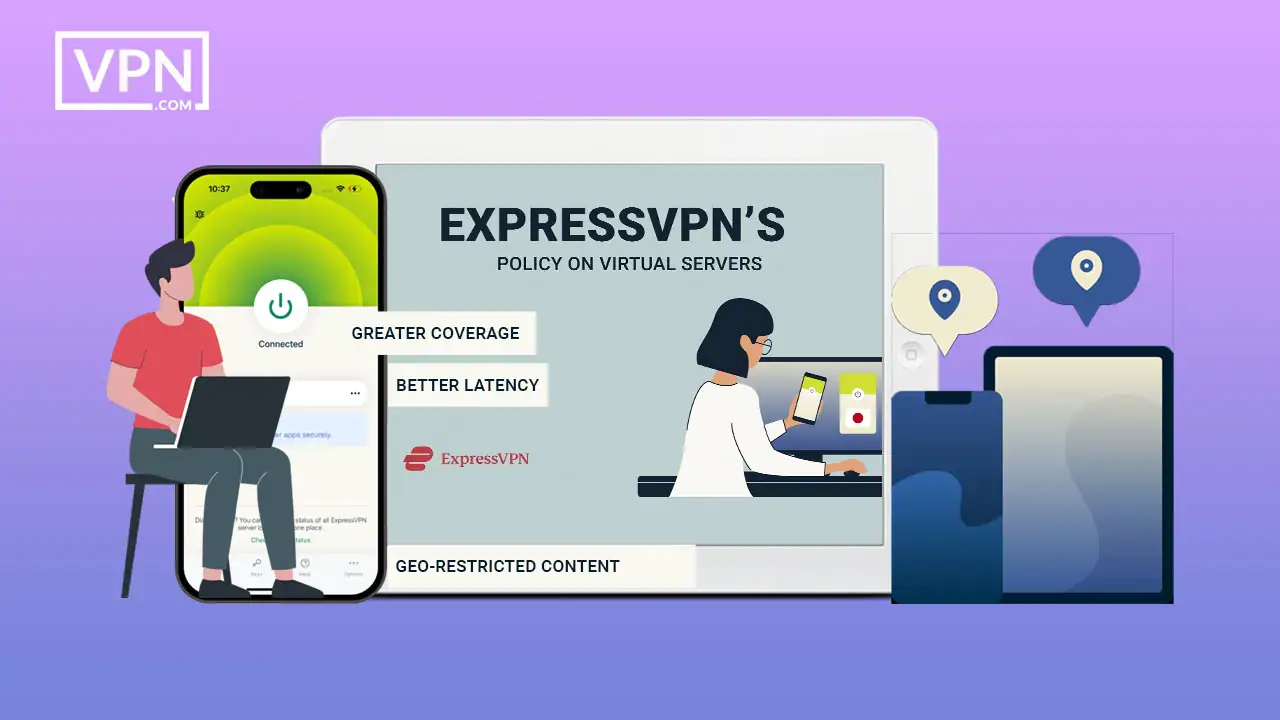
The digital age has made online privacy and global access are necessities for the user. A virtual server from a VPN provider allows you to connect, seemingly coming from somewhere other than the actual location. This can enhance accessibility and accelerate speeds, but ultimately means people want answers to security and transparency questions. In this chapter, we’ll understand the virtual server policy of ExpressVPN, describing what they are, why they exist, and what implications they hold for the user. This is essential to fine-tune one’s web experience while preserving privacy.
Definition of Virtual Servers
Virtual servers are another technology in the form of a server that makes it possible for VPN providers to create multiple servers in different places without having to have actual hardware in every region. They accomplish this by using software to simulate a physical server so that users may connect to a server that seems like it is located in a specific location when the actual hardware could be anywhere else.
VPN services use virtual servers for these and many other reasons and benefits, like offering IP addresses in areas where real server infrastructures are not financially or structurally possible. Moreover, virtual servers can extend the provider’s geographical presence and make it possible to view the material from any part of the world with relative ease.
ExpressVPN’s Transparency on Virtual Servers
One of its strengths is that the company is transparent with the issue of virtual servers. It spells out where and why they use them. For example, when they cannot obtain a server in a particular region or country due to various reasons—such as some Middle Eastern or African regions—ExpressVPN uses virtual ones. That way, users in those regions get to browse with local IP addresses, hence having a much better internet experience.
ExpressVPN also says that virtual servers are marked within the software so that users are always aware when they are accessing a virtual, rather than physical, server. Such information enables users to make informed decisions over which servers to access.
Pros and Cons of Virtual Servers
Pros:
- Greater Coverage: Virtual servers can be utilized to cover areas where it is not feasible to cover up through physical servers. This is particularly useful in areas where infrastructure is scarce.
- Better Latency: Virtual servers can make low-speed internet connectivity better and speedier. Poor internet speed connectivity is mostly a problem in underdeveloped regions with very little development of infrastructure. This, therefore, means that users in these areas will get access to whatever content is available much more easily and maybe instantly.
- Access to Geo-Restricted Content: Virtual servers give access to geo-restricted content because it allows users to acquire IP addresses, located in other areas, thus allowing them to access web services and websites that may not be accessible in their origin country.
Cons:
- Slightly Lower Speeds: Since virtual servers share the infrastructure in a completely different location, they may not run as well as the dedicated physical server does. Users can get slightly lower speeds, especially when the virtual server is far from their actual location.
- Security Concerns: People doubt that virtual servers might not be as secure as their physical cousins because they depend on the infrastructure of third parties.
ExpressVPN’s Mitigation Strategies
To achieve this goal, ExpressVPN uses several measures for security and performance even while using virtual servers:
- Secure routing of data: ExpressVPN routes your data securely whether you are using a physical or virtual server; the data will always be encrypted and away from the view of unauthorized observers.
- High-Quality Infrastructure: ExpressVPN invests in robust infra to ensure its virtual servers are as fast and dependable as possible. It checks server performance 24/7 to optimize both speed and reliability.
- Transparency and User Control: ExpressVPN lets a user know the times that a user is connected to a virtual server, keeping users in control of their connections.

Enjoy Virtual Servers & Security With ExpressVPN
- Real-Time Monitoring
- High Uptime
- Load Balancing
- Lightway Protocol
Frequently Asked Questions
How many servers does ExpressVPN hold worldwide?
ExpressVPN holds more than 3000 servers in 105 countries, thus giving users worldwide access to fast and secure connections regardless of their location.
Where are the best ExpressVPN servers in the US?
New York and Los Angeles servers in Dallas lead the pack in overall performance, and lightning speed for streaming, gaming, and more!
Where does ExpressVPN stand among the other VPNs in terms of number of servers?
While NordVPN and CyberGhost may boast more servers, ExpressVPN prioritizes speed, security, and global reach.
Why do virtual servers matter for ExpressVPN?
Their use of virtual servers in countries with little infrastructure means that users can safely carry out their operations at fairly rapid speed while accessing local IP addresses.
How Does ExpressVPN Optimize Server Performance?
ExpressVPN’s Lightway protocol, load balancing, and real-time monitoring ensure fast, stable connections, even during peak hours.
The Bottom Line
ExpressVPN offers a big network of servers worldwide, helping people use the internet safely and access content from different countries. With over 3000 servers in 105 countries, users can connect from almost anywhere. The company focuses on making its servers fast and reliable, using special technology to keep information safe.
ExpressVPN is open about how they work, including their use of virtual servers in some places. They have popular server locations in the US, like New York and Los Angeles, and use smart methods to prevent servers from getting too busy. They’ve also created a fast new connection method called Lightway.
While connection speed can vary based on factors like server location and your internet service, ExpressVPN aims to provide a consistently good experience. Overall, they work hard to give users a fast, safe, and dependable way to use the internet from anywhere, constantly improving their service and being honest about everything.